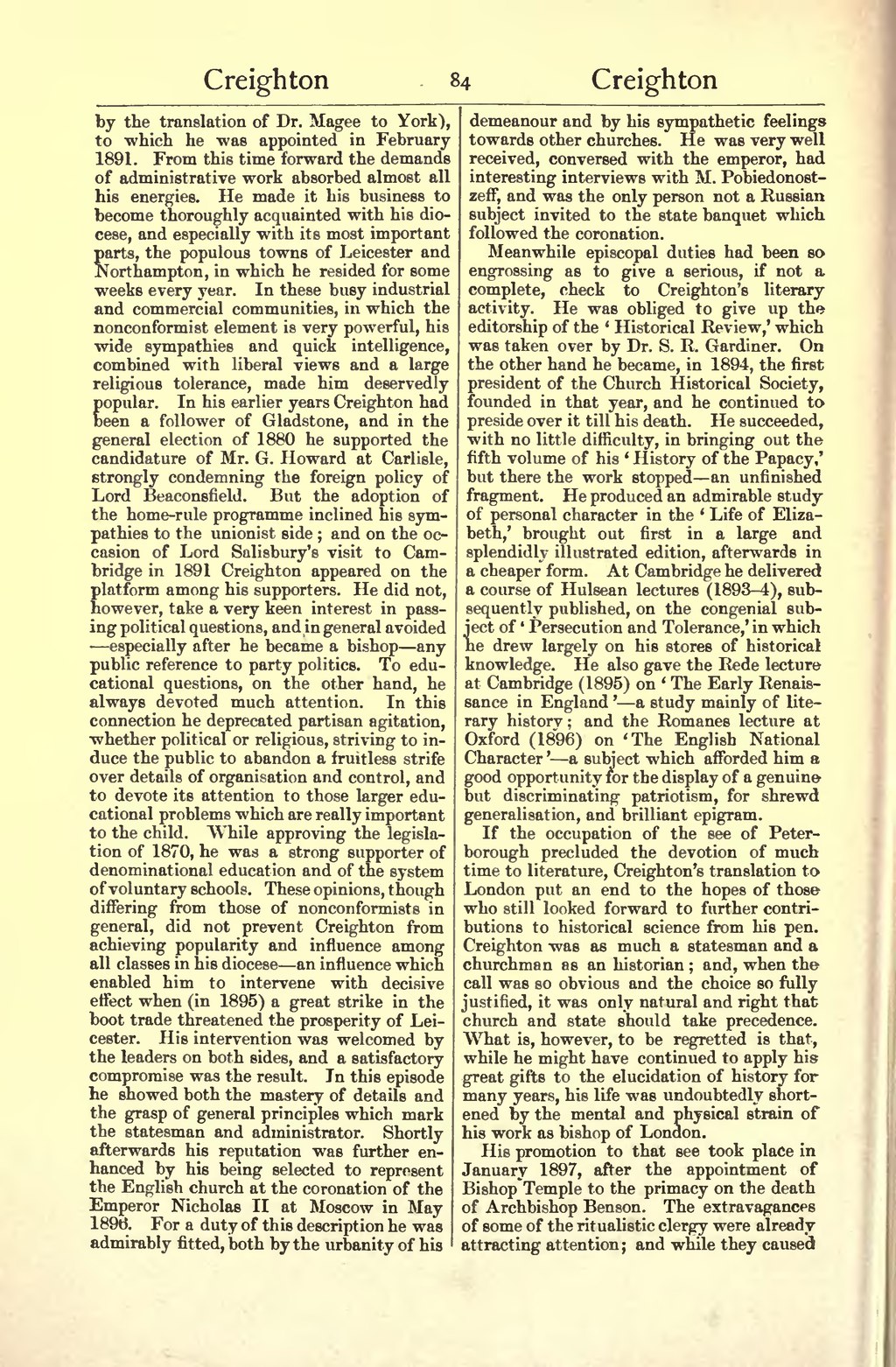by the translation of Dr. Magee to York), to which he was appointed in February 1891. From this time forward the demands of administrative work absorbed almost all his energies. He made it his business to become thoroughly acquainted with his diocese, and especially with its most important parts, the populous towns of Leicester and Northampton, in which he resided for some weeks every year. In these busy industrial and commercial communities, in which the nonconformist element is very powerful, his wide sympathies and quick intelligence, combined with liberal views and a large religious tolerance, made him deservedly popular. In his earlier years Creighton had been a follower of Gladstone, and in the general election of 1880 he supported the candidature of Mr. G. Howard at Carlisle, strongly condemning the foreign policy of Lord Beaconsfield. But the adoption of the home-rule programme inclined his sympathies to the unionist side ; and on the occasion of Lord Salisbury's visit to Cambridge in 1891 Creighton appeared on the platform among his supporters. He did not, however, take a very keen interest in passing political questions, and in general avoided especially after he became a bishop any public reference to party politics. To educational questions, on the other hand, he always devoted much attention. In this connection he deprecated partisan agitation, whether political or religious, striving to induce the public to abandon a fruitless strife over details of organisation and control, and to devote its attention to those larger educational problems which are really important to the child. While approving the legislation of 1870, he was a strong supporter of denominational education and of the system of voluntary schools. These opinions, though differing from those of nonconformists in general, did not prevent Creighton from achieving popularity and influence among all classes in his diocese an influence which enabled him to intervene with decisive effect when (in 1895) a great strike in the boot trade threatened the prosperity of Leicester. His intervention was welcomed by the leaders on both sides, and a satisfactory compromise was the result. In this episode he showed both the mastery of details and the grasp of general principles which mark the statesman and administrator. Shortly afterwards his reputation was further enhanced by his being selected to represent the English church at the coronation of the Emperor Nicholas II at Moscow in May 1896. For a duty of this description he was admirably fitted, both by the urbanity of his demeanour and by his sympathetic feelings towards other churches. He was very well received, conversed with the emperor, had interesting interviews with M. Pobiedonostzeff, and was the only person not a Russian subject invited to the state banquet which followed the coronation.
Meanwhile episcopal duties had been so engrossing as to give a serious, if not a complete, check to Creighton's literary activity. He was obliged to give up the editorship of the 'Historical Review,' which was taken over by Dr. S. R. Gardiner. On the other hand he became, in 1894, the first president of the Church Historical Society, founded in that year, and he continued to preside over it till his death. He succeeded, with no little difficulty, in bringing out the fifth volume of his 'History of the Papacy,' but there the work stopped an unfinished fragment. He produced an admirable study of personal character in the 'Life of Elizabeth,' brought out first in a large and splendidly illustrated edition, afterwards in a cheaper form. At Cambridge he delivered a course of Hulsean lectures (1893-4), subsequently published, on the congenial subject of 'Persecution and Tolerance,' in which he drew largely on his stores of historical knowledge. He also gave the Rede lecture at Cambridge (1895) on 'The Early Renaissance in England' a study mainly of literary history ; and the Romanes lecture at Oxford (1896) on 'The English National Character ' a subject which afforded him a good opportunity for the display of a genuine but discriminating patriotism, for shrewd generalisation, and brilliant epigram.
If the occupation of the see of Peterborough precluded the devotion of much time to literature, Creighton's translation to London put an end to the hopes of those who still looked forward to further contributions to historical science from his pen. Creighton was as much a statesman and a churchman as an historian; and, when the call was so obvious and the choice so fully justified, it was only natural and right that church and state should take precedence. What is, however, to be regretted is that, while he might have continued to apply his great gifts to the elucidation of history for many years, his life was undoubtedly shortened by the mental and physical strain of his work as bishop of London.
His promotion to that see took place in January 1897, after the appointment of Bishop Temple to the primacy on the death of Archbishop Benson. The extravagances of some of the ritualistic clergy were already attracting attention ; and while they caused
